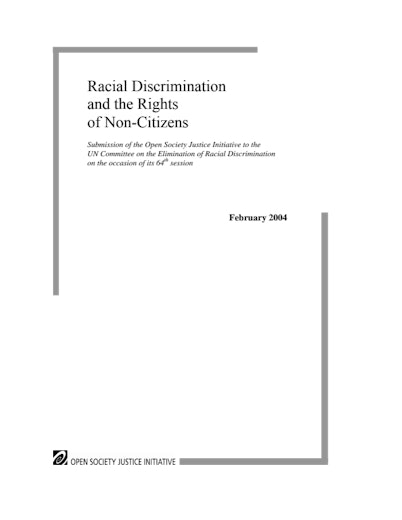The Rights of Noncitizens: A Discussion Among Global Advocates
The rights of noncitizens are increasingly under attack. In the aftermath of September 11, 2001, governments have been placing further restrictions on the right of asylum and the rights of migrant workers and their families. Denationalization and arbitrary or discriminatory access to citizenship, with consequent statelessness, are also growing phenomena throughout the world. Many individuals become noncitizens without ever having crossed an international border.
Excluded from most democratic political processes, noncitizens rarely have a voice in public policy. They do not enjoy an absolute right of residence in the countries in which they live, and are often denied access to protective legal mechanisms. Lacking state protection, noncitizens are particularly vulnerable to human rights abuses. Their vulnerabilities are compounded by the fact that many are also racial or ethnic minorities in their countries of residence.
On March 1-2, 2004, the UN Committee on the Elimination of Racial Discrimination convened a special thematic session to consider the rights of noncitizens. On February 28-29, 2004, the Open Society Justice Initiative hosted a parallel meeting of human rights in Geneva, Switzerland, where advocates and nongovernmental organizations from around the world gathered to discuss the most pressing vulnerabilities suffered by noncitizens, collaborate on making specific recommendations to the Committee on the Elimination of Racial Discrimination, and consider potential advocacy initiatives. Items on the agenda included the following:
- Discrimination against noncitizens.
- Violence toward and expulsion of noncitizens.
- Racial discrimination in access to citizenship.
- Denationalization and statelessness.
- Mandate and procedures of the Committee on the Elimination of Racial Discrimination and possibilities for nongovernmental organizational intervention.
The more than 40 conference participants represented a wide variety of organizations (international monitoring bodies, national coalitions, national monitoring bodies, grassroots organizations based in refugee camps) and interests (migrants, refugees and asylum-seekers, indigenous activists, general human rights). They came from more than 15 countries, including Bhutan, Côte d'Ivoire, the Dominican Republic, Estonia, Germany, Lebanon, Mexico, Nigeria, the Russian Federation, Spain, Thailand, and Zambia. Several committee members, including the Danish, Russian, and American representatives, attended portions of the conference.
The conference generated lively, informative, and valuable discussions on such topics as the validity of "noncitizen" as a unifying category, cross-region and cross-country comparison of advocacy strategies, the effectiveness of international and regional protection mechanisms, and future initiatives for the protection of noncitizens. In addition to exchanging views and comments with members of the Committee on the Elimination of Racial Discrimination during the parallel conference, the assembled participants drew up and presented a set of "talking points" to the committee in an informal session on March 1, 2004, which was welcomed warmly by the committee members. Several participants submitted written documents to the Committee on the Elimination of Racial Discrimination in advance of the thematic session and testified before the committee on the afternoon of March 1, 2004. According to the public statements of committee members, these testimonies were invaluable in increasing their awareness and understanding of the current problems faced by noncitizens throughout the world.
This report summarizes the most important discussions and decisions of the conference.
Topics
- Climate Justice
- Digital Rights and Fair Elections
- Discrimination and Racial Justice
- International Crimes
